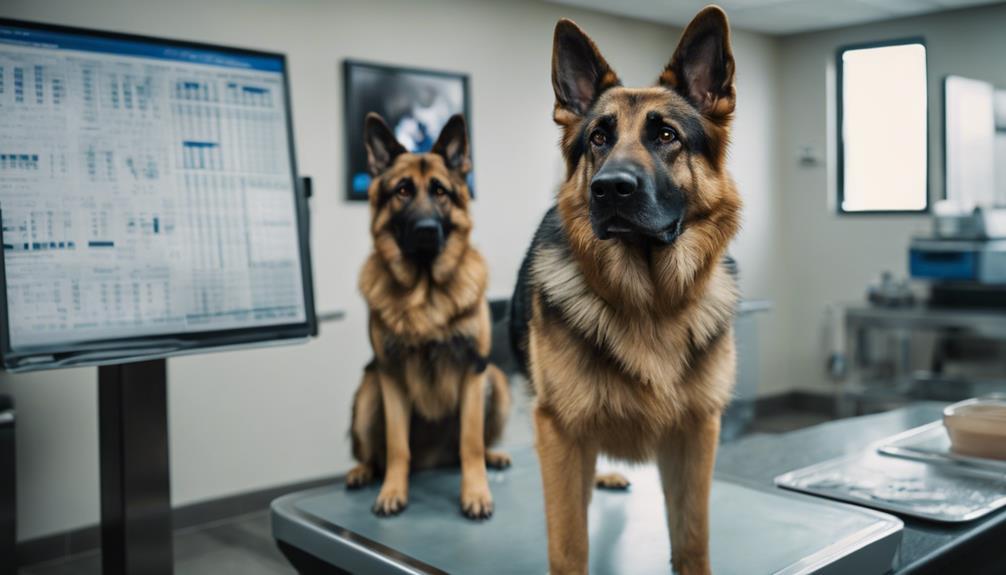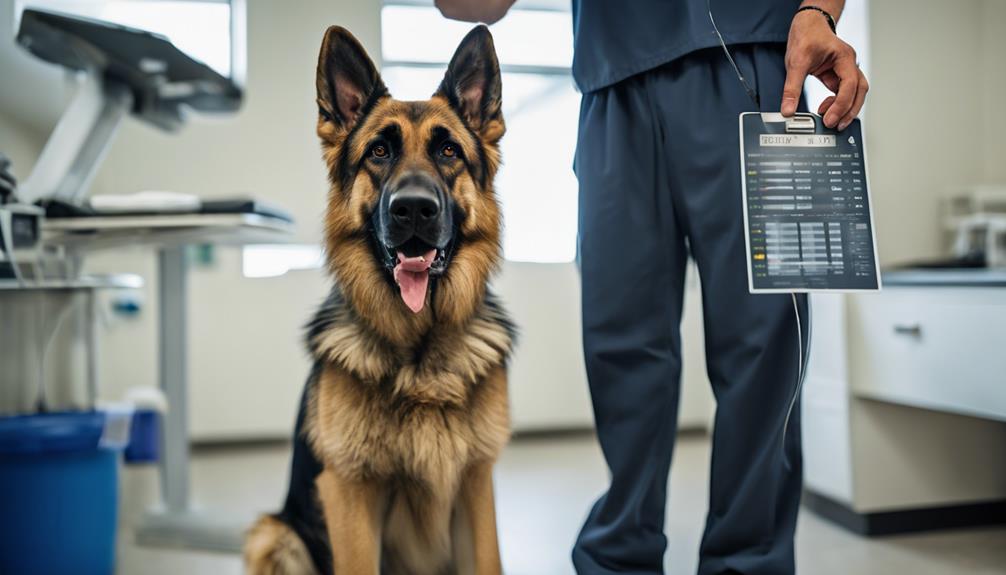🐾 Paw-some Partnership Alert! 🐾
As a pack of German Shepherd enthusiasts at MixGermanShepherd.com, we're always sniffing out the best products for our furry friends. Guess what? When you fetch something from Amazon through our links, we earn a little treat! 🦴
When it comes to managing the weight of your German Shepherd mix, striking a balance is key. You understand the importance of maintaining their health, but have you considered the impact of their diet and exercise routines on their weight?…
Key Takeaways
- Tailor diet to lean protein and vegetables for German Shepherd mixes.
- Use precise portion control and transition to weight management formulas.
- Regular vet check-ups and body weight tracking are crucial.
- Seek professional guidance for successful weight management strategies.
Carbohydrate Reduction

By reducing carbohydrates in the diet of your German Shepherd mix, you can effectively control calorie intake and facilitate weight loss. Opting for low-carb vegetables and high-quality protein sources can aid in muscle maintenance while limiting the risk of obesity-related health issues in your beloved pet. German Shepherd mixes require a balanced diet to ensure they stay healthy and energized.
Carbohydrate reduction plays a vital role in weight management for German Shepherd mixes, as it helps prevent spikes in blood sugar levels and promotes a stable energy supply. By incorporating a diet rich in low-carb vegetables and high-quality protein, you are supporting your pet's overall well-being. This approach not only aids in weight loss but also contributes to maintaining a healthy weight over time.
Ensuring your German Shepherd mix receives the right balance of nutrients through carbohydrate reduction is key to managing their weight effectively. By focusing on quality ingredients and monitoring their carbohydrate intake, you can help your pet lead a healthier and more active life.
Protein Increase

Increasing the protein intake in the diet of your German Shepherd mix can significantly aid in weight management by promoting muscle maintenance and increasing satiety levels. High-quality protein sources, such as lean meat, play a crucial role in supporting weight loss efforts for your furry friend. Here are some key points to consider when increasing the protein intake for your German Shepherd mix:
- High-quality protein like lean meat provides essential nutrients that can aid in weight loss.
- Protein-rich diets help maintain muscle mass while reducing overall calorie intake, supporting weight management.
- Incorporating protein-rich foods into your dog's diet can enhance their metabolism, further assisting in weight loss.
- Protein is essential for helping your German Shepherd mix feel full and satisfied while on a weight management plan.
Vegetable Substitution

To enhance weight management for your German Shepherd mix, consider incorporating low-calorie vegetables such as carrots, green beans, and sweet potatoes as substitutes for some kibble in their diet. Vegetables provide essential nutrients, fiber, and bulk to help your dog feel full while reducing overall calorie intake. By adding these vegetables, you can promote weight loss while ensuring your dog receives the necessary vitamins and minerals for their overall health.
| Vegetables | Benefits |
|---|---|
| Carrots | Source of beta carotene and fiber |
| Green Beans | Vitamins and minerals without excess calories |
| Sweet Potatoes | Rich in vitamins A and C, fiber, antioxidants |
Incorporating these low-calorie vegetables not only aids in weight management but also adds variety and interest to your dog's diet. Remember to introduce new foods gradually and monitor your dog's weight and overall well-being as you make adjustments to their diet.
Regular Exercise

Regular exercise is crucial for maintaining a healthy weight and overall well-being in German Shepherd mixes, ensuring their physical and mental health needs are met. To effectively manage weight and promote muscle development in your German Shepherd mix, consider the following:
- Daily Walks: Regular walks provide essential physical activity and mental stimulation for your dog.
- Play Sessions: Engage in interactive play sessions to keep your German Shepherd mix active and entertained.
- Tailored Exercise Routines: Adjust exercise intensity based on your dog's fitness level and age to prevent weight gain and enhance muscle growth.
- Varied Activities: Incorporate activities like fetch, agility training, or obedience classes to keep your dog physically fit and mentally sharp.
Small, Frequent Meals

To optimize weight management for your German Shepherd mix, consider implementing small, frequent meals. This feeding approach can assist in regulating blood sugar levels, maintaining steady metabolism, and preventing overeating. By dividing daily food portions into smaller meals, you can control portion sizes, aid in digestion, and potentially reduce the risk of bloating or gastrointestinal issues.
Meal Timing Tips
Implementing a meal schedule consisting of small, frequent meals is beneficial for managing weight in German Shepherd mixes. When it comes to meal timing for your furry friend, consider the following tips:
- Regulating Blood Sugar: Small, frequent meals can help regulate blood sugar levels, preventing spikes and crashes.
- Boosting Metabolism: Offering meals at regular intervals throughout the day can boost metabolism, aiding in weight management.
- Preventing Digestive Issues: Splitting daily food portions into smaller meals can prevent digestive issues and promote better nutrient absorption.
- Reducing Hunger Pangs: Feeding multiple small meals can prevent hunger pangs, reduce begging behavior, and maintain energy levels in German Shepherd mixes.
Portion Control Strategies
When managing the weight of your German Shepherd mix through small, frequent meals, employing effective portion control strategies is crucial. Portion control plays a significant role in regulating calorie intake, promoting weight management, and supporting optimal digestion in your pet. By dividing your dog's daily food into smaller, controlled portions, you can prevent overeating, maintain steady blood sugar levels, and enhance nutrient absorption. This approach not only aids in monitoring your German Shepherd mix's weight but also helps prevent bloating and gastrointestinal issues. Consistent portion control ensures that your pet's metabolism remains steady, preventing excessive weight gain and promoting overall health. Therefore, implementing portion control strategies is essential for the well-being and weight management of your German Shepherd mix.
Healthy Treats

For optimal weight management in your German Shepherd mix, opt for nutritious treats such as baby carrots or green beans to support their health goals. These low-calorie options can be satisfying for your pup without contributing to weight gain. Additionally, consider using frozen blueberries or apple slices as healthy and tasty treats for your mixed breed. These fruits are packed with essential nutrients and can be a refreshing snack for your furry friend. Homemade treats can also be a great option, especially when made with ingredients like pumpkin, sweet potatoes, or lean turkey, providing both taste and nutrition. Avoid high-fat and high-sugar treats to prevent unwanted weight gain in your German Shepherd mix. Look for treats specifically designed for weight management or low-calorie options to support your mixed breed's overall well-being. Your furry companion will appreciate these healthy choices while staying on track with their weight management plan.
Health Check-ups

Ensure you schedule regular health check-ups with a veterinarian to closely monitor your German Shepherd mix's weight and overall health status. These visits are crucial for detecting any underlying health conditions that could affect your dog's weight management program. By staying proactive with preventive health measures and following weight monitoring tips provided during check-ups, you can effectively support your German Shepherd mix's well-being and weight management journey.
Regular Vet Visits
Regular vet visits play a crucial role in monitoring the health status of German Shepherd mixes and addressing any potential issues promptly. Here's why they are essential:
- Early Detection: Routine check-ups help in the early identification of health problems for timely interventions.
- Personalized Advice: Vets can offer tailored advice on weight management plans based on the individual needs of your German Shepherd mix.
- Tracking Progress: Scheduled health check-ups allow for monitoring weight changes, ensuring the effectiveness of the weight management plan.
- Overall Well-being: Consistent veterinary care is vital for maintaining the overall health and longevity of your German Shepherd mix. Regular visits to the vet are key to ensuring your furry friend's well-being.
Weight Monitoring Tips
To effectively monitor your German Shepherd mix's weight and overall health, scheduling regular vet check-ups is imperative. Utilize a physical calendar or your phone to track weight changes accurately and monitor progress consistently. Weighing your dog on a weekly basis allows for a closer assessment of the effectiveness of the weight management plan in place. By observing weight trends over time, you can make informed decisions to adjust diet and exercise routines for optimal results. If there are persistent issues with weight loss or gain despite your efforts, consulting your veterinarian is crucial for tailored advice and guidance.
| Weight Monitoring Tips | |
|---|---|
| Use a physical calendar or phone for tracking weight changes accurately | Weigh your dog weekly to assess progress effectively |
| Monitor weight trends over time for informed decisions on adjustments | Consult your veterinarian for persistent weight issues |
Preventive Health Measures
For optimal health maintenance in German Shepherd mixes, staying proactive with preventive health measures through regular veterinary check-ups is vital. When it comes to preventive health measures, consider the following:
- Regular Check-ups: Schedule routine visits to monitor weight, assess body condition score, and discuss specific dietary and exercise needs for effective weight management.
- Vaccinations and Parasite Control: Ensure your dog is up to date on vaccinations and follow a proper parasite control program recommended by your veterinarian.
- Dental Care: Maintain good oral hygiene by brushing your dog's teeth regularly and scheduling dental cleanings as needed.
- Early Detection: Regular check-ups help in early detection of health issues, supporting weight management goals and overall well-being.
Weight Assessment Methods

When assessing the weight of your German Shepherd mix, utilize the Body Condition Score (BCS) scale for an accurate evaluation of their weight status. Look for signs of overweight such as a lack of a visible waistline and the inability to feel your dog's ribs easily. Regularly weigh your German Shepherd mix and compare the results to the average weight range for their breed and size. If you have concerns about their weight, consult a vet for a professional assessment and to create a tailored weight management plan. Factors like age, activity level, and overall health should be considered when assessing and managing your German Shepherd mix's weight. By using the BCS scale and monitoring their weight closely, you can ensure that your furry companion maintains a healthy weight to support their well-being.
Ribs Evaluation

When assessing your German Shepherd mix's weight, feeling for their ribs is crucial. You should aim to detect the ribs beneath a thin layer of muscle and skin. Proper rib evaluation can guide you in maintaining your dog's weight within a healthy range.
Rib Visibility Guidelines
To properly assess the weight condition of a German Shepherd mix, it is important to evaluate the visibility and feel of their ribs. Here are some guidelines to help you determine if your dog's ribs are at a healthy visibility level:
- Ribs should be easily felt with slight pressure along the sides.
- Ideally, you should see a hint of the last rib without excessive fat covering.
- A healthy weight condition allows for rib palpation without ribs being prominently visible.
- If ribs are highly visible or difficult to feel, the dog may be underweight.
Monitoring the visibility of your dog's ribs is crucial for assessing weight changes and making necessary adjustments in feeding and exercise routines.
Optimal Weight Range
Evaluating the optimal weight range for your German Shepherd mix involves assessing the visibility and feel of their ribs to ensure they are easily palpable but not overly prominent. Feeling the ribs with gentle pressure can help determine if your dog is within a healthy weight range. An ideal weight for your German Shepherd mix includes a slight waistline when viewed from above, indicating proper weight management. Regularly monitoring the rib area can assist in tracking weight changes and adjusting diet and exercise as needed. Remember, consulting a vet for guidance on the optimal weight range based on your specific mix's size, age, and activity level is highly recommended.
| Rib Evaluation | Optimal Weight Range | Action Needed |
|---|---|---|
| Easily palpable | Ideal weight | Maintain |
| Overly prominent | Underweight | Increase feeding |
| Not palpable | Overweight | Adjust diet/exercise |
Monitoring Body Condition
Assessing your German Shepherd mix's body condition involves feeling along the sides to determine the palpability of their ribs. Here are some key points to consider:
- Run your hands along the sides: Feel for the ribs to assess body condition.
- Ribs should be easily felt: A healthy weight is indicated when ribs are palpable without excess fat covering them.
- Ideal body condition score: Ribs should be palpable but not prominently visible.
- Adjust diet and exercise: Maintain optimal weight by adjusting their diet and exercise regimen based on rib palpability.
Regularly checking your dog's ribs allows you to track changes in body condition and make necessary adjustments to their weight management strategies for a healthier and happier German Shepherd mix.
Mobility Observation

Monitoring your German Shepherd mix's mobility through regular observation of their walking, running, and stair-climbing abilities is essential for assessing any changes in movement patterns that may indicate underlying joint issues, arthritis, or weight-related constraints. By paying close attention to how your dog moves, you can detect early signs of discomfort or pain. Look for stiffness, reluctance to exercise, limping, or any alterations in their gait. Tracking these mobility changes is crucial in tailoring exercise routines, dietary plans, and veterinary care to support weight management and overall well-being. Below is a table to help you understand the significance of mobility observation in your German Shepherd mix.
| Mobility Observation | Significance |
|---|---|
| Changes in Gait | Could indicate joint problems or arthritis |
| Reluctance to Move | Might signal discomfort or pain |
| Limping | Suggests potential injury or weight issues |
| Stiffness | Could be a sign of joint discomfort |
Health Monitoring

To ensure the optimal health of your German Shepherd mix, it is crucial to maintain regular vet check-ups and track their body weight consistently. These practices allow you to monitor any weight-related issues early on and address them promptly. By staying proactive in health monitoring, you can effectively support the well-being and longevity of your German Shepherd mix.
Regular Vet Check-Ups
Schedule regular veterinary check-ups every 6-12 months to monitor the health and weight of your German Shepherd mix. During these visits, your vet can provide personalized advice on weight management strategies based on your dog's specific needs. Here's why these check-ups are crucial:
- Health Monitoring: Regular vet check-ups allow for comprehensive health monitoring, including weight assessment.
- Early Detection: Detecting any underlying health issues early on can prevent complications that may impact weight management.
- Tailored Recommendations: Vets can recommend adjustments to your dog's diet, exercise routine, and overall care plan to support their health and weight goals.
- Professional Guidance: Benefit from professional guidance to ensure your German Shepherd mix stays healthy and maintains an ideal weight.
Body Weight Tracking
Regularly track your German Shepherd mix's body weight to effectively monitor changes and assess the impact of your weight management plan. Schedule weekly weigh-ins to evaluate fluctuations and the success of your efforts. Monitoring your dog's weight is crucial for gauging progress, tweaking strategies as needed, and promptly addressing any issues that may arise. This practice is especially useful for understanding how dietary modifications, exercise regimens, and overall health influence your dog's weight. If despite your best efforts, your German Shepherd mix continues to either lose or gain weight unexpectedly, it's advisable to seek guidance from a veterinarian promptly to ensure your pet's well-being.
| Benefits of Body Weight Tracking |
|---|
| – Monitors Changes |
| – Assesses Weight Management |
| – Evaluates Progress |
| – Identifies Health Concerns |
Vet Check-ups

Ensure your German Shepherd mix receives routine vet check-ups every 6-12 months to monitor weight and overall health effectively. Regular vet visits are crucial for managing the weight of German Shepherd mixes. Here's how these check-ups can benefit your dog:
- Early Detection: Vet visits help detect any weight management issues early on.
- Tailored Advice: Vets can provide personalized weight loss or gain plans based on your dog's breed, age, and activity level.
- Body Condition Scoring: Vets can perform body condition scoring to assess your dog's weight accurately.
- Preventive Care: Regular check-ups are vital for maintaining optimal weight and preventing health issues in German Shepherd mixes.
Weight Loss Diet

To aid in the effective management of weight for your German Shepherd mix, consider tailoring their diet to support weight loss and meet their specific nutritional requirements. German Shepherd mixes benefit from a weight loss diet that includes high-quality, low-calorie foods. Opt for lean protein sources such as chicken, turkey, or fish to help maintain muscle mass while reducing fat. Incorporating a variety of vegetables not only adds essential nutrients but also helps your dog feel full without consuming excess calories. Controlled portions are crucial in managing weight, so measuring your dog's food accurately is important. Consulting with a vet can provide personalized guidance on creating a weight loss plan tailored to your German Shepherd mix's needs. Gradually transitioning to weight management formulas from reputable brands can further support your dog's health goals. By focusing on a balanced diet with controlled portions, you can help your German Shepherd mix achieve and maintain a healthy weight.
Portion Measurement

For precise weight management of your German Shepherd mix, accurately measuring food portions based on factors like weight, activity level, and weight goals is crucial. When it comes to portion measurement for your furry friend, follow these essential steps:
- Determine Portion Sizes: Calculate the appropriate portion sizes by considering your dog's weight, activity level, and weight management goals.
- Use Measuring Tools: Ensure accuracy by using a measuring cup or scale to portion out your dog's food.
- Gradual Adjustments: Make gradual changes to portion sizes to avoid sudden dietary shifts for your German Shepherd mix.
- Consult a Professional: Seek guidance from a vet or canine nutritionist to determine the precise portion sizes tailored to your specific German Shepherd mix.
Frequently Asked Questions
What Is a Healthy Weight for a German Shepherd Mix?
Maintaining a healthy weight for a German Shepherd mix involves finding the ideal weight range through regular monitoring and consultation with a vet. Incorporate an exercise routine, portion control, and nutritional balance for effective weight management.
What Can I Feed My German Shepherd to Lose Weight?
If you want your German Shepherd to shed some pounds, focus on a diet rich in lean proteins, controlled carbs, and appropriate portion sizes. Combine this with regular exercise, nutritional balance, and calorie tracking for optimal weight loss results.
How Can I Help My Overweight German Shepherd?
To help an overweight dog, create an exercise routine that fits their activity level, control portions, offer low-calorie treats, consult a vet, consider weight loss supplements, and monitor progress closely for effective weight management.
What Is Good for German Shepherds to Put Weight On?
To put weight on German Shepherds, focus on high-calorie foods, muscle-building exercises, and a consistent feeding schedule. Incorporate weight gain supplements, portion control, and tailored exercise routines. Consult a vet for personalized guidance.
Conclusion
In conclusion, managing the weight of German Shepherd mixes requires a multi-faceted approach. By reducing carbohydrates, increasing protein intake, substituting with vegetables, engaging in regular exercise, and monitoring their health, owners can ensure their furry companions stay healthy and fit. Consulting with a vet for personalized plans and measuring portions accurately are essential steps in achieving successful weight management. Remember, a balanced diet and active lifestyle are key to keeping German Shepherd mixes in optimal shape.
